Debate on Venezuela at Bristol Latin American Forum 2007
- 14 March 2007
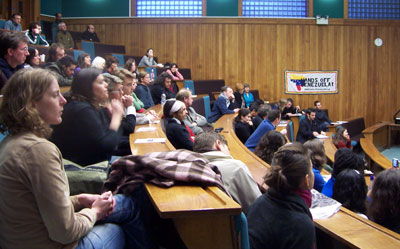 This year the University of Bristol hosted its second Latin American
Forum organised by a coalition of solidarity campaigns. Around 120-150 people
filled the lecture rooms to debate and discuss the revolutionary social
movements that are currently sweeping across Latin America.
A variety of workshops and films explored strategies against the neo-liberal
agenda, "which has imposed a series of devastating 'reforms', a term now
being used by capitalist governments and multinationals as a code word for
counter-reforms", explained Martin Silvers from the Colombia Solidarity
Campaign, "repealing welfare systems, and privatising industry. The
problem is that deregulation and privatisation don't work! It has led to
massive drops in living standards and working conditions."
This year the University of Bristol hosted its second Latin American
Forum organised by a coalition of solidarity campaigns. Around 120-150 people
filled the lecture rooms to debate and discuss the revolutionary social
movements that are currently sweeping across Latin America.
A variety of workshops and films explored strategies against the neo-liberal
agenda, "which has imposed a series of devastating 'reforms', a term now
being used by capitalist governments and multinationals as a code word for
counter-reforms", explained Martin Silvers from the Colombia Solidarity
Campaign, "repealing welfare systems, and privatising industry. The
problem is that deregulation and privatisation don't work! It has led to
massive drops in living standards and working conditions."
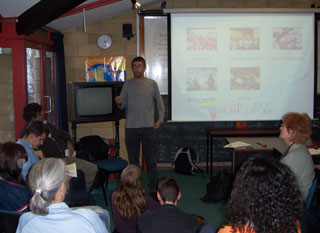 "Is this really
what 'modernisation' brings us," asked Jose Sagaz from the Bolivia
Solidarity Campaign. Jose explained that privatisation of their already corrupt
gas industry had reduced revenue into the state from $350milion to a pathetic
$50million. The rest went into the pockets of British Petroleum and Repsol
amongst others. He also presented a very powerful video explaining the
development of the revolutionary struggle of the workers and peasants in Bolivia,
particularly the uprisings in October 2003 and May-June 2005 which eventually
led to the election of the Evo Morales government in December 2006.
"Is this really
what 'modernisation' brings us," asked Jose Sagaz from the Bolivia
Solidarity Campaign. Jose explained that privatisation of their already corrupt
gas industry had reduced revenue into the state from $350milion to a pathetic
$50million. The rest went into the pockets of British Petroleum and Repsol
amongst others. He also presented a very powerful video explaining the
development of the revolutionary struggle of the workers and peasants in Bolivia,
particularly the uprisings in October 2003 and May-June 2005 which eventually
led to the election of the Evo Morales government in December 2006.
Multinationals continue to loot Colombia, aided and abetted by its pro-Washington government, reported Richard Solly from the Colombia Solidarity Campaign, at huge social and environmental costs.
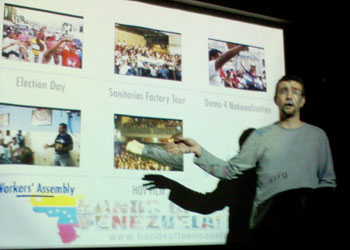 However, at the
forefront of the discussions was the revolutionary wave of resistance that is
being built in reaction to these attacks. The people of Latin
America are commonly of the opinion that capitalism has nothing
more to offer them, and that what is needed is a new type of system where the
common people hold power and control over the running of society.
However, at the
forefront of the discussions was the revolutionary wave of resistance that is
being built in reaction to these attacks. The people of Latin
America are commonly of the opinion that capitalism has nothing
more to offer them, and that what is needed is a new type of system where the
common people hold power and control over the running of society.
One of the ideas discussed at the Forum was what Venezuelan president Hugo Chavez has called Socialism of the 21st Century. In the workshop on Venezuela, Jorge Martin from the Hands Off Venezuela Campaign used the example of the struggle of Sanitarios Maracay, which he said, "represents the most effective strategy against capitalist exploitation". The workers are proving that they can run even the most advanced industries by themselves. The case of the Venezuelan oil workers proved this in 2002. Jorge also explained that the cooperative model can be very progressive, but that it doesn't necessarily solve the problem of profit orientated private business. Many workers in Venezuela, like those of the occupied Sanitarios Maracay are calling for full nationalisation of the economy to be democratically run under workers' control. This is what they understand as socialism of the 21st century.
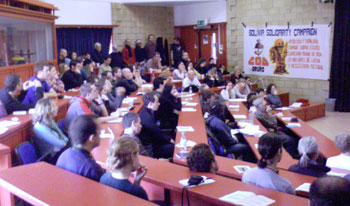 Another well-attended
workshop was the one on Cuban hip-hop, with the presence of veteran Cuban
hip-hop groups, Obsesión and Los Paisanos. Their members answered questions
about the discrimination against women in hip-hop and Cuban culture in general,
explained how theirs was conscious hip-hop to be used as a revolutionary tool
of struggle, discussed issues of censorship and finally insisted that their
main hope for the future was "the lifting of the embargo on Cuba",
stressing they were part of the revolution.
Another well-attended
workshop was the one on Cuban hip-hop, with the presence of veteran Cuban
hip-hop groups, Obsesión and Los Paisanos. Their members answered questions
about the discrimination against women in hip-hop and Cuban culture in general,
explained how theirs was conscious hip-hop to be used as a revolutionary tool
of struggle, discussed issues of censorship and finally insisted that their
main hope for the future was "the lifting of the embargo on Cuba",
stressing they were part of the revolution.
The workshop on Venezuela was extremely well attended and was complemented by another workshop by Thomas Muhr PhD from University of Bristol, on the changes in Higher Education in Venezuela. He explained the impact of the education misiones and particularly how the Bolivarian University was taking higher education into poor and working class communities around the country.
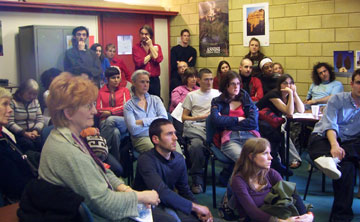 The subject of Socialism
of the 21st Century was raised again at the well attended closing session,
where the Venezuelan Ambassador, Alfredo Toro-Hardy, gave a long fact filled
speech, and answered many questions from an inspired audience. Venezuela is one of the only countries in Latin America where recent polls showed that a majority
of its population was satisfied with the levels of democracy, Alfredo
explained. On the question of mass media manipulation, Alfredo spoke of the
importance of the emerging alternative media. And, on the question of Cuba, the Ambassador stated that the Cuban
revolution has been fundamental to the future of Latin
America, and that he greatly respected the Cuban example. The
Ambassador went on to say that "If socialism means putting human needs
first, then I am a socialist."
The subject of Socialism
of the 21st Century was raised again at the well attended closing session,
where the Venezuelan Ambassador, Alfredo Toro-Hardy, gave a long fact filled
speech, and answered many questions from an inspired audience. Venezuela is one of the only countries in Latin America where recent polls showed that a majority
of its population was satisfied with the levels of democracy, Alfredo
explained. On the question of mass media manipulation, Alfredo spoke of the
importance of the emerging alternative media. And, on the question of Cuba, the Ambassador stated that the Cuban
revolution has been fundamental to the future of Latin
America, and that he greatly respected the Cuban example. The
Ambassador went on to say that "If socialism means putting human needs
first, then I am a socialist."
This Forum was a great success, and shows continued growing interest in revolutionary politics, attracting young and old and bringing cultures together at a time when many feel that our own political system in the west is breaking down.
For another report and more pictures, see Indymedia Bristol
The following is a video of Jorge Martin speaking in one of the workshops:

 Please help build the campaign by
Please help build the campaign by